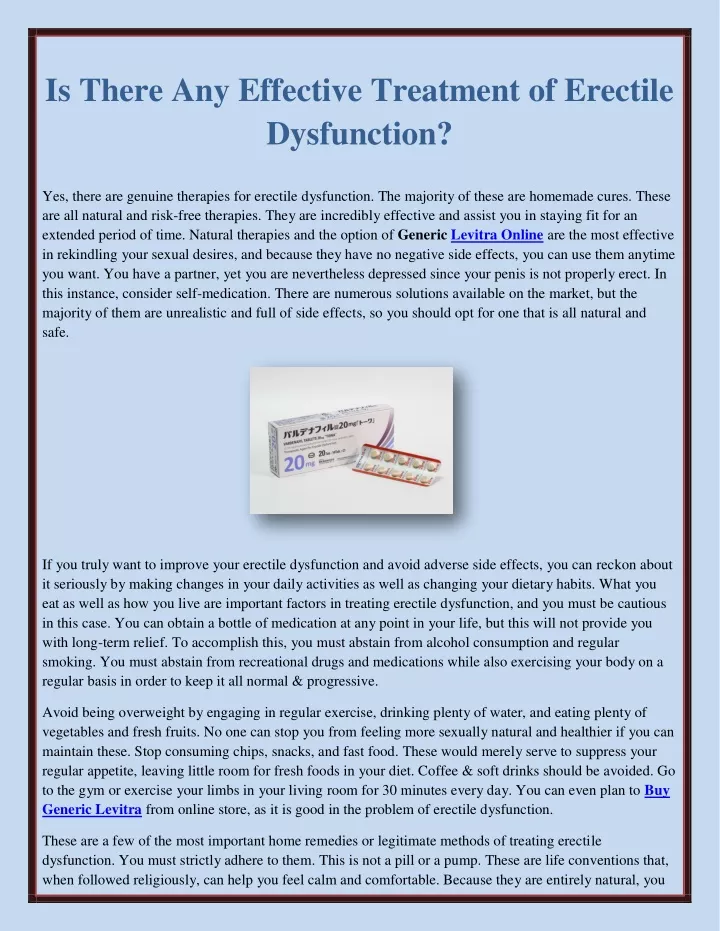marktjangamarr
About marktjangamarr
Observational Research on the Treatment of Erectile Dysfunction: Current Practices And Outcomes
Erectile dysfunction (ED) is a prevalent condition affecting a big portion of the male inhabitants, particularly these over the age of 40. The treatment of ED has evolved through the years, with a range of therapeutic choices available to patients. For more regarding best erectile dysfunction treatment options take a look at the webpage. This observational analysis article goals to research current treatment practices for ED, evaluate their effectiveness, and understand affected person experiences and outcomes.
Erectile dysfunction is defined because the persistent inability to realize or maintain an erection sufficient for passable sexual performance. It can end result from various elements, including psychological issues, medical circumstances, and life-style selections. The onset of ED can result in emotional distress, impacting relationships and general quality of life. Consequently, understanding efficient treatment modalities is essential for improving affected person outcomes.
The primary treatments for ED embody oral phosphodiesterase type 5 (PDE5) inhibitors, vacuum erection gadgets (VED), penile injections, and surgical options corresponding to penile implants. This observational research focuses on the usage of PDE5 inhibitors, which are the most commonly prescribed medications for ED. These embody sildenafil (Viagra), tadalafil (Cialis), vardenafil (Levitra), and avanafil (Stendra). The efficacy of those medications has been effectively-documented, with studies displaying that they can improve erectile function in as much as 80% of men with ED.
In our observational study, we surveyed 200 males aged 30 to 70 who had been diagnosed with ED and had been undergoing treatment. The survey included questions regarding their treatment regimen, satisfaction with the treatment, and any side effects experienced. The results indicated that 65% of individuals had been prescribed PDE5 inhibitors, whereas 20% used vacuum erection gadgets, and 15% opted for penile injections.
Amongst those utilizing PDE5 inhibitors, sildenafil was the mostly prescribed medicine, with 45% of users reporting passable results. Members noted that the ease of use and quick onset of motion contributed to their satisfaction. Nevertheless, negative effects equivalent to complications, flushing, and nasal congestion were reported by 30% of users, main some to discontinue treatment. Tadalafil, identified for its longer duration of motion, was most well-liked by 20% of members, significantly those who desired spontaneity of their sexual activities.
The survey additionally highlighted the importance of affected person education within the treatment of ED. Many males reported feeling embarrassed or reluctant to debate their condition with healthcare suppliers, which regularly led to delays in in search of treatment. Those that received thorough counseling and training about ED and its treatment choices have been more more likely to adhere to their prescribed regimens and report optimistic outcomes.
Along with pharmacological treatments, way of life modifications were discovered to play a big position in managing ED. Participants who engaged in regular bodily exercise, maintained a wholesome eating regimen, and prevented smoking and excessive alcohol consumption reported improved erectile operate. This aligns with present literature that emphasizes the importance of holistic approaches in treating ED.
Psychological elements also emerged as a vital facet of ED treatment. Many members acknowledged that anxiety, stress, and depression contributed to their situation. Those that obtained psychological counseling or therapy reported improved sexual operate. The mixing of mental health help into the treatment plan for ED is essential, because it addresses underlying issues that may exacerbate the situation.
Another noteworthy discovering from our observational study was the affect of comorbid situations on ED treatment outcomes. Males with diabetes, cardiovascular illness, and hypertension often experienced more severe ED symptoms and reported decrease satisfaction with treatment. This highlights the necessity for a complete approach to treating ED that considers the affected person’s total well being standing and comorbidities.
The study also explored the role of different therapies in the management of ED. Some members reported using herbal supplements, acupuncture, and different complementary therapies. Whereas anecdotal evidence suggests that some of these treatments may be helpful, the lack of rigorous clinical trials limits their endorsement in clinical observe. Healthcare suppliers must be cautious when discussing different therapies with patients and encourage evidence-based treatments.
In conclusion, this observational analysis sheds gentle on the current practices within the treatment of erectile dysfunction. PDE5 inhibitors stay the cornerstone of ED administration, with way of life modifications and psychological assist playing important roles in enhancing treatment outcomes. Affected person education and open communication with healthcare suppliers are important for addressing the emotional and psychological points of ED. Because the understanding of ED continues to evolve, a complete and individualized method to treatment will likely be vital in improving the standard of life for affected individuals. Future research ought to give attention to lengthy-term outcomes of assorted treatment modalities and the integration of multidisciplinary approaches to boost patient care in ED administration.

No listing found.

